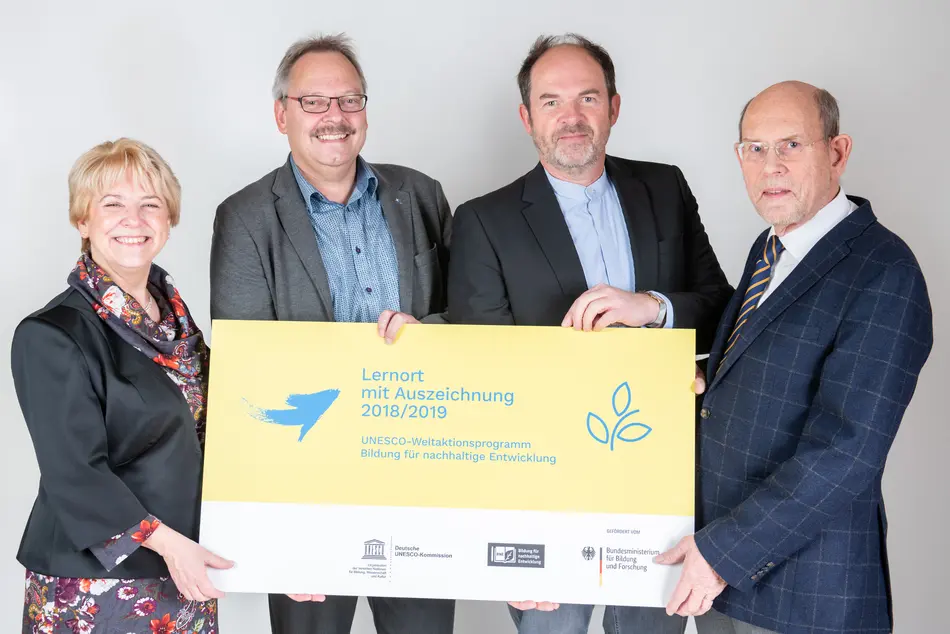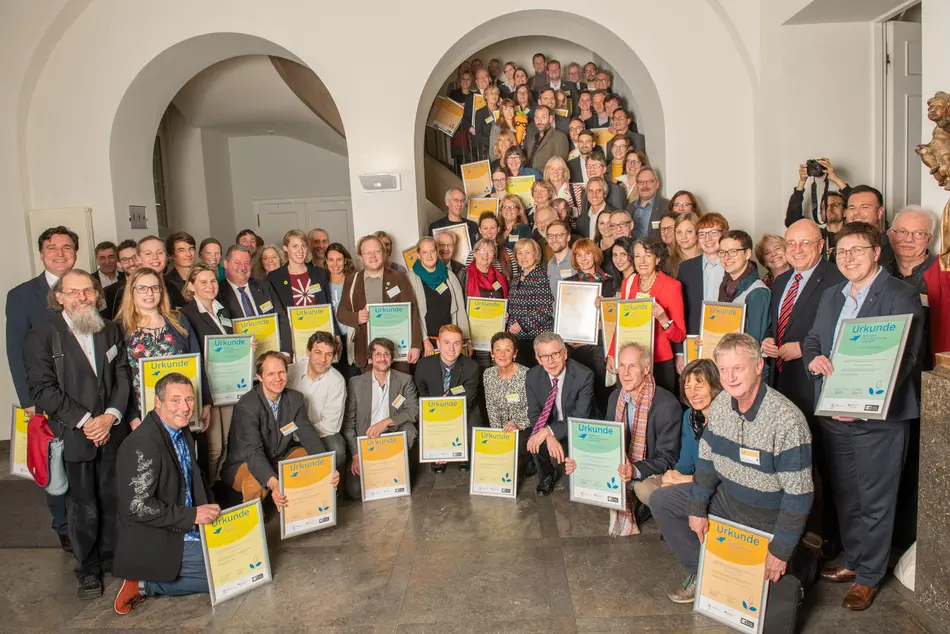The German Federal Ministry of Education and Research and the German UNESCO Commission honor the Environmental Campus Birkenfeld as an outstanding educational initiative for sustainable development.
A school that uses a rainwater harvesting system. Global learning partnerships in which vocational students learn about sustainable business. A municipality that promotes education, resource conservation, climate protection and mobility in its region - good educational examples of sustainable development in practice are numerous. Under the motto "Excellent", State Secretary Christian Luft of the Federal Ministry of Education and Research (BMBF) and the President of the German UNESCO Commission (DUK) Prof. Dr. Maria Böhmer awarded 32 learning sites, 43 networks and 6 municipalities for their outstanding commitment to education for sustainable development on November 28 2018 in Bonn.
The Environmental Campus Birkenfeld was recognized in the third round of awards as an ESD learning site with the award at level 3, the highest level to be achieved. The jury summarized its decision as follows: "The Environmental Campus Birkenfeld manages to implement ESD in its study programs with a focus on "Environment and Sustainability" in a structurally effective way. The students benefit from a particularly meaningful participation and design offer. They participate in the development of the university in many ways, are systematically integrated into decision-making processes and can thus exert a targeted influence."
Since 2005, the Environmental Campus Birkenfeld has received awards from the United Nations World Decade of Education for Sustainable Development (ESD) five times. Award winners were the Study Semester "Principles of Sustainable Business " and the international study program "International Material Flow Management" IMAT. In January 2008, the Environmental Campus Birkenfeld was honored as a "Selected Landmark" among 1,500 locations participating in the competition by the location initiative "Germany - Land of Ideas". In 2010, the Environmental Campus Birkenfeld was able to achieve second place and in 2012 even first place as Germany's greenest university location in the comprehensive ranking of universities by Utopia GmbH. The rank as "Germany's greenest campus" was confirmed in 2017 by the jump into the top ten of the worldwide university ranking GreenMetric. Also in 2017, the environmental campus won the ISCN Award in the category "Campus Planning and Management Systems". The International Sustainable Campus Network (ISCN) is the world's largest university network for sustainability in teaching and research.
Under the main topics "Environment and Sustainability ", students at the Environmental Campus Birkenfeld are offered a future-oriented education in the fields of environmental planning/technology and environmental economics/law. The idea of environment and sustainability forms the thematic link between the study programs and promotes an intensive and interdisciplinary cooperation between the individual disciplines. The networking of ecological, economic, technical and social concerns in the sense of education for sustainable development should enable students to analyze and optimize complex systems in their later work.
Education for sustainable development is already firmly anchored in the founding mission of the Environmental Campus Birkenfeld, which began teaching as a location of Trier University of Applied Sciences in 1996. The property of the Environmental Campus had served as a reserve hospital for the American armed forces in Germany until 1992. The concept of the Environmental Campus Birkenfeld provides for an interdisciplinary education under the framework aspect of the material cycle in the sense of sustainable development. The campus model is based on the "residential campus" known from American universities, which combines living, learning and working in one place. Since its founding in 1996, the Environmental Campus Birkenfeld has stood for a holistic orientation towards sustainability, which applies equally to teaching, research and the operation of the university. To implement the sustainability strategy, the so-called "Sustainability Council" was established at the Environmental Campus Birkenfeld. It is an association of all relevant stakeholders of the Environmental Campus Birkenfeld who deal with the topic of sustainability. The primary goal is the continuous development as well as the definition of new goals to ensure long-term sustainable management at the Environmental Campus Birkenfeld. The starting point for the implementation is the annual presentation of the actual situation. Subject of the investigation is the examination and presentation of all in- and output factors of the Environmental Campus Birkenfeld. Furthermore, weak points are identified and new solutions are proposed. The results are documented and subsequently made available to all participants. With the regular publication of the sustainability report, the goals and recommendations for action are also presented to the public.
Since 2016, the BMBF and the DUK have been awarding prizes to educational initiatives once a year as part of the national implementation of the UNESCO World Programme of Action on Education for Sustainable Development. The selection is made by a jury consisting of members of the National Platform ESD as well as representatives of the BMBF, Freie Universität Berlin and DUK. In addition to learning content, methods and learning processes, the award-winning actors align all their actions with ESD. They also orient their own management to principles of sustainability. In this way, they contribute to structurally anchoring ESD in the German educational landscape. As an official contribution to the World Action Program, they present themselves on the website of the ESD Portal and benefit from the exchange with other actors in a broad knowledge and practice network. In addition, Freie Universität Berlin and the DUK are available to advise the initiatives on questions regarding further development.
![[Translate to Englisch:] Übersicht: Die globalen Ziele für nachhaltige Entwicklung](/fileadmin/_processed_/9/e/csm_SDGs-DE_4887x2392px-gross_162084afe3.webp)
Sustainable development means realizing human dignity and equal opportunities for all in an intact environment. Education is central to sustainable development. It enables people to make decisions for the future and to assess how their own actions will affect future generations or life in other regions of the world. The United Nations' Global Sustainability Agenda 2030 and UNESCO's World Programme of Action on Education for Sustainable Development (2015-2019) enshrine the implementation of ESD as a goal for the global community. Germany is participating with the National Action Plan on Education for Sustainable Development, which was adopted by the National Platform on ESD in June 2017.


ESD is the abbreviation for Education for Sustainable Development. It refers to education that enables people to think and act in a way that is fit for the future: How do decisions affect people of future generations or in other parts of the world? What effects does it have, for example, how we consume, what means of transport we use, or what and how much energy we consume?
Education for sustainable development enables every individual to understand the impact of their own actions on the world and to make responsible decisions.
You are leaving the official website of Trier University of Applied Sciences